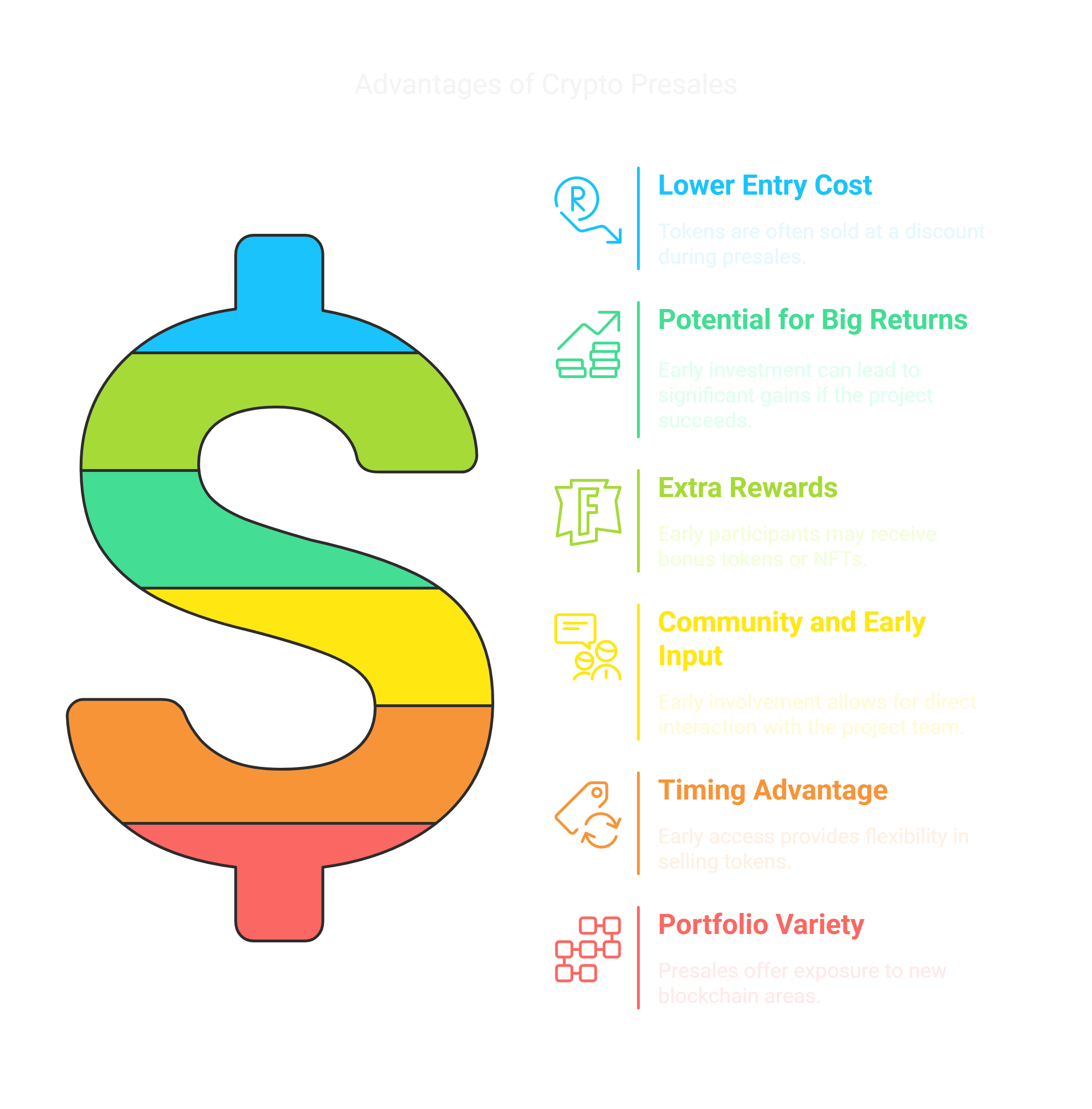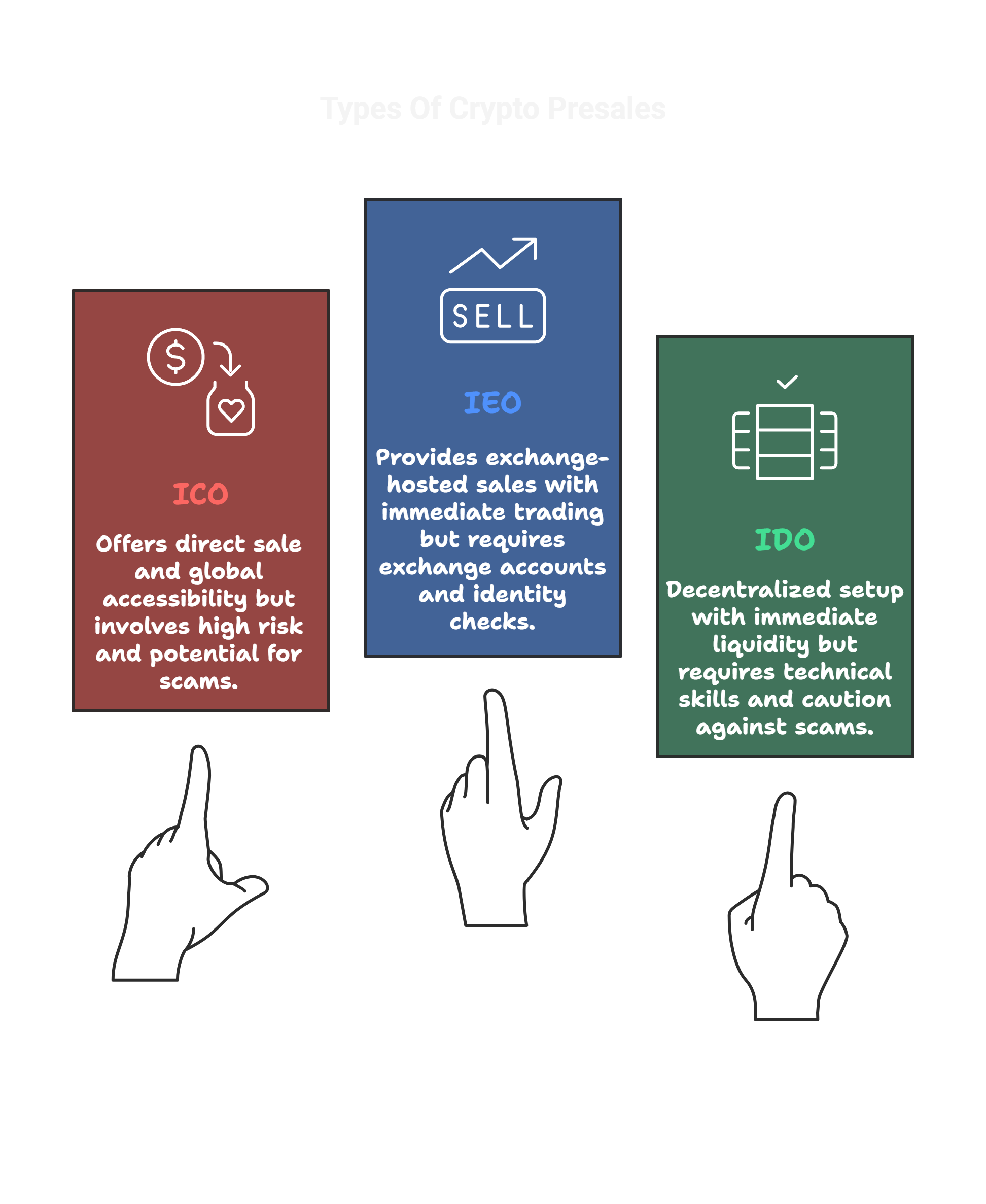A crypto presale is an early fundraising event where a new project sells its tokens before they appear on regular exchanges. Buyers get a chance to own these tokens at lower prices. The main idea is to support the project’s development at an early stage while aiming for possible gains if the token’s price rises later.
It’s comparable to purchasing shares of a startup before it goes on the stock market, except here you’re buying digital tokens. Some newcomers might find this appealing because projects often offer discounted rates. That lower entry cost can be attractive, though it also carries significant uncertainty. This guide walks through the basics, types of presales (ICO, IEO, IDO, and more), along with the reasons people invest and the hazards involved.
How Do Crypto Presales Work?
Understanding how these early token sales function step by step can clear up the mystery. People sometimes feel intimidated by them, but the process can be simpler than it looks. Below is an outline of the usual path:
Announcement and Whitepaper
A project’s team shares details about the upcoming presale. This can include the total number of tokens, presale dates, cost per token, and a technical document explaining how the project operates. The announcement stage is mostly about generating interest among those who might invest.
Registration or Whitelisting
Sometimes, you need to sign up or be granted a slot before you can buy tokens. These lists (often called whitelists) help the project’s creators manage the number of buyers. It also avoids chaos when the token goes on sale, since only approved addresses or accounts can participate.
Contribution Phase
Once the sale officially begins, participants send funds—often in well-known cryptocurrencies like Ethereum or stablecoins—to reserve the new tokens. There may be a minimum or maximum cap on each individual’s purchase. The tokens are bought at an agreed price, which is usually set in advance.
Token Distribution
After the sale ends, the project delivers tokens to those who purchased them. Sometimes this happens right away. In other cases, tokens are locked so nobody can dump them instantly. A lock-up or vesting period might last weeks or months. It’s a method to avoid price shocks and to maintain some stability for the project as it continues to build.
Launch and Listing on Exchanges
The final step is when the project makes the token available for wider trading, often on either a decentralized or centralized exchange. At this point, others beyond presale buyers can trade the token. Those who bought during the presale might enjoy a higher price if market demand increases. Of course, there is no guarantee that will happen; prices may also drop if buyers lose interest or if the broader market trends downward.
What Are the Types of Crypto Presales?
Crypto presales can be hosted in different ways. Here are the three types of presales process that most of the crypto choose these days
1. Initial Coin Offerings (ICOs)
ICOs are probably the most recognized kind of crypto presale. A few key things help explain why they became so prominent:
Direct Sale to Supporters
Projects often sell tokens right from their own website or a specialized portal. Buyers send certain accepted coins (like Ethereum) and provide a wallet address to receive the project’s tokens. This often makes an ICO globally accessible without a traditional middleman.
Open to Many
During the ICO craze in 2017, anyone with internet access and a compatible wallet could join. This was a key reason ICOs became widely known. There were few barriers. That openness, though, also led to questionable projects springing up.
Past Boom
There was an explosion of ICOs during 2017’s crypto market rush. People chased large gains, and some got them. Others lost money when projects vanished or never delivered a functioning product. It was an era of excitement but also of cautionary tales.
Large Rewards but High Risk
Some ICO participants saw massive returns. Ethereum is a standout example, where its early token sale priced ETH at only a fraction of a dollar. That said, the lack of regulation and oversight made it easy for bad actors to take advantage of new buyers. The phrase “do your own research” became more than a cliché—many discovered the hard way that not every shiny new token is real.
Ethereum’s Famous ICO
Ethereum’s token sale in 2014 raised millions at around $0.30 per ETH (some might recall slightly varying figures, but they are in that ballpark). Over the following years, ETH soared to hundreds or even thousands of dollars. This success reinforced the idea that an ICO can be life-changing if the project succeeds.
2. Initial Exchange Offerings (IEOs)
IEOs work a bit differently compared to ICOs. With an IEO, a project teams up with a major exchange to organize the presale:
Hosted on an Exchange
In this arrangement, the exchange itself manages the token sale on behalf of the project. Participants usually need an account on that exchange, and they often must go through identity checks before buying tokens.
Less Chaos, Though Still Risky
The exchange runs some level of evaluation before listing a project. That can bring a bit more reassurance, though it doesn’t mean success is guaranteed. Buyers might feel a little safer that an exchange (like Binance or KuCoin) won’t host something blatantly shady, but caution is still needed.
Immediate Trading
After the offering, the token is often listed on that exchange’s trading platform right away. This can bring a wave of buying and selling in the initial hours and days. Presale buyers get faster access to liquidity (the ability to sell or trade quickly) compared to older ICO models, where you might wait in limbo for an exchange to pick it up.
Competitive Entry
IEOs on top exchanges can sell out in moments. Some require participants to hold or use the exchange’s own token to access the sale, which might add extra steps for newcomers. There can be lottery systems or other methods designed to spread out opportunities. It can still be tough to secure a slot if demand is off the charts.
3. Initial DEX Offerings (IDOs)
IDOs happen on decentralized platforms. This became more common once decentralized finance grew in popularity around 2020. Instead of depending on a centralized entity, these sales are handled by automated smart contracts on a decentralized exchange (DEX):
Decentralized Setup
An IDO is open to anyone with a suitable wallet. It might require connecting to a platform like Uniswap, PancakeSwap, or a specialized launchpad. No single authority decides who can join, although some IDOs do create “whitelist” steps to manage participants. This approach can be appealing to those who prefer a system without centralized gatekeepers.
Need for Tech Skills
Anyone can join, but it involves some comfort with crypto wallets, setting transaction fees, and so forth. This can be intimidating for total beginners. Mistakes with sending funds to the wrong address or misconfiguring gas can cause losses.
Immediate Liquidity
Many IDOs simultaneously create a liquidity pool on the DEX when the presale goes live. Buyers can trade the token as soon as the sale is done, which might cause big price swings. Sometimes prices spike, then crash within hours, as everyone tries to find the “fair” price.
Extra Freedom, Extra Caution
There’s no centralized body acting as a quality checkpoint. Any project, good or bad, might set up an IDO. That raises the risk of scams. It also means global access for smaller projects that might not get an exchange’s attention right away.
Other Crypto Presale Formats (STOs and More)
Some token sales use formats beyond the common ICO, IEO, or IDO. Two noteworthy examples are:
Security Token Offerings (STOs)
- Regulated Route: STOs treat the token as a regulated security, meaning investors might receive actual equity or profit shares instead of a simple “utility” token.
- Limited to Certain Investors: Because of traditional finance rules, STOs often require participants to be accredited, pass identity checks, and be located in regions that allow such offers. This structure can guard against scams but also reduce who can participate.
- Slower But More Controlled: There’s a heavier legal framework around STOs. Projects adopting this method are often aiming to comply with government rules, which can provide a sense of legitimacy. At the same time, it might limit the scale of early fundraising.
Private Sales and Seed Rounds
- Early Rounds for Bigger Investors: Many projects hold private sales for venture capital funds or large angel investors before a public token sale. Those investors sometimes get an even lower price, but they often face strict token lock-ups.
- Not Open to Everyone: Smaller or newer investors rarely join these seed rounds since they’re often by invitation only. When the presale goes public, it’s actually not the first time tokens were sold.
Benefits of Participating in Crypto Presales

These opportunities can be tempting for those who like to support a project at its earliest stage. Some appealing points are:
- Lower Entry Cost: Tokens sold in a presale often have a discounted price. If the project grows, that discount can lead to higher returns than buying on the open market later.
- Potential for Big Returns: Some projects experience skyrocketing prices once they launch and attract attention. That’s the dream scenario where a small stake turns into a large amount. Not every presale works out that way, but the possibility exists.
- Extra Rewards: Early participants might get perks like bonus tokens, airdrops, or exclusive non-fungible tokens (NFTs). The team may want to reward the first group of believers.
- Community and Early Input: Being part of the initial wave can connect you to the project’s core team or Discord group. This sometimes leads to shaping the direction of the project or sharing feedback they might actually consider.
- Timing Advantage: Getting tokens before the general public hears about them can be an edge. If the project is truly promising, others might drive up demand once it’s on major exchanges. Early buyers then have more flexibility to decide if and when they want to sell.
- Portfolio Variety: Token presales let you explore newer areas of blockchain, which might broaden your holdings beyond established coins like Bitcoin. That could balance your positions, though it also adds new kinds of uncertainty.
Risks and Challenges of Crypto Presales
Presales sound exciting, but they aren’t a sure path to profit. A few of the most pressing problems include:
- Scams and Fraud: The open nature of crypto allows anyone to create a slick website and run off with investor funds. Some fraudulent groups promise big returns, collect money, then vanish. It’s essential to research thoroughly and approach each offer with a bit of caution.
- Project Failure: Even honest teams may fail to deliver if they lack resources, face strong competition, or run into technical dead ends. Tokens can drop in value or never gain traction if the project falls short.
- Lock-Up Periods: Many presales require buyers to keep tokens locked for a while. This prevents quick selling that might crash the price. It also means you can’t react swiftly if you want to exit. If the price dips during the lock-up, you’re stuck.
- Price Swings: New tokens can be extremely volatile once trading starts. Rapid price climbs followed by dramatic drops can happen within a day. Early buyers might panic or rush to sell, creating a confusing price environment.
- Regulatory Shifts: Governments around the world still debate how to regulate digital assets. A new law could prohibit the trading of tokens from certain projects, freeze exchange listings, or impose heavy restrictions.
- Opportunity Cost: Money tied up in one presale might miss out on other investment openings. If you lock funds for months, you could watch other coins or stocks rise during that period. And if your chosen presale flops, you lose both money and time.
- Hype and Misleading Promotions: Public relation campaigns can oversell a project’s capabilities. It’s easy to get swept up in marketing language. A level head is advisable, even if others seem overly enthusiastic.
Examples of Successful Crypto Presale Campaigns
Plenty of presales have not gone anywhere. But a few made history:
Ethereum (2014)
In 2014, Ethereum raised millions by selling ETH at a price roughly around $0.30. Over time, it became the second-largest cryptocurrency by market value, hitting prices in the thousands of dollars per token. Anyone who held through the ups and downs likely saw remarkable returns. This case showed that a smart contract platform could evolve into a massive network over the years.
Solana (2020)
Solana sold tokens around $0.22 each during an early sale. It later climbed to more than $200 at one point, which is hundreds of times more than the presale price. This was a prime example of how a blockchain focusing on speed and scalability could capture market attention.
Binance Coin (2017)
BNB launched at around $0.15 through its token sale. The team behind it then built the Binance exchange, which became one of the largest in the world. BNB’s value soared well beyond most expectations, reaching triple-digit prices. Early participants who kept their tokens benefited significantly.
Frequently Asked Questions
What distinguishes a crypto presale from an ICO?
A presale often happens before the main public offering. Many times, it involves a smaller group of early supporters or a discounted price that rewards them for taking a chance. An ICO might be the broad sale that follows, open to anyone interested. Some projects merge the terms, so the exact definitions can blur.
How do I join a presale if I’m new?
You’d normally look for projects on crypto calendars or platforms that list upcoming token offerings. Then, you’d follow the team’s instructions, which might involve joining a whitelist or setting up an account on the specific launch site. Make sure to use official links. Scammers sometimes create fake websites that copy the genuine ones.
Do I need a personal wallet?
In most cases, yes. If it’s an ICO or IDO, you usually need a wallet like MetaMask. If it’s an IEO, the exchange where the sale is hosted might handle the process inside your trading account. It’s important to keep private keys or login info secure. Sending funds from an exchange wallet to an ICO contract might cause complications, so make sure to follow each project’s specific guidelines.
Are presale tokens locked?
It depends on the rules each project sets. Many have a vesting schedule, meaning tokens release in segments over time. Others let you have the tokens right away but might set a temporary freeze to avoid immediate selling. Checking the project’s token release terms helps you plan any trading or holding strategy.
Can crypto presales make me rich?
They can bring large gains if the project does well, but it’s never guaranteed. Many presales fail or only see mild success. It’s wise to treat these opportunities as high-risk wagers. Only put in funds you’re prepared to lose and try to read as much as you can about the project’s tech, team, and market.
Where can I find upcoming presales?
Some websites and social media accounts track presales, such as specialized listing sites or crypto forums. Launchpads (like those run by major exchanges) also announce new events regularly. Be alert when scanning social media because there are plenty of fakes.
What should I look at before committing money?
Check if the project solves a genuine need. See if the team is transparent about their identities and track record. Analyze the token’s economic model (supply, distribution, lock-ups, use cases). Glance at the project’s roadmap and whether they’ve met milestones so far. If everything seems either too vague or overly grand, it might be wise to be skeptical.
Are presales legal in my country?
Regulations vary a lot. Some places have tight rules, while others are more open. Certain nations ban crypto sales entirely. Others allow them if they meet specific conditions. If in doubt, it’s usually prudent to review the legal situation in your region or consult a professional.


